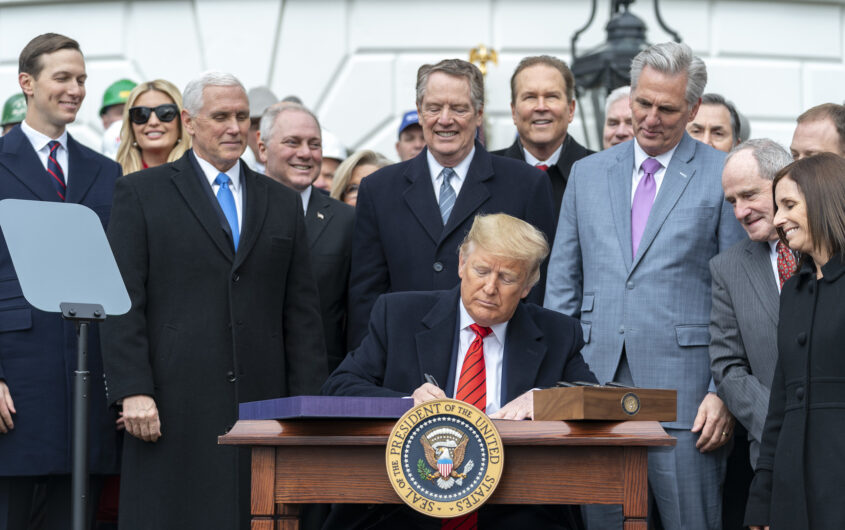
Trump White House via Flickr
Groundhog Day Trade Policy

Peter S. Rashish
Vice President; Director, Geoeconomics Program
Peter S. Rashish, who counts over 30 years of experience counseling corporations, think tanks, foundations, and international organizations on transatlantic trade and economic strategy, is Vice President and Director of the Geoeconomics Program at AICGS. He also writes The Wider Atlantic blog.
Mr. Rashish has served as Vice President for Europe and Eurasia at the U.S. Chamber of Commerce, where he spearheaded the Chamber’s advocacy ahead of the launch of the Transatlantic Trade and Investment Partnership. Previously, Mr. Rashish was a Senior Advisor for Europe at McLarty Associates, Executive Vice President of the European Institute, and a staff member and consultant at the International Energy Agency, the World Bank, UN Trade and Development, the Atlantic Council, the Bertelsmann Foundation, and the German Marshall Fund.
Mr. Rashish has testified before the House Financial Services Subcommittee on International Monetary Policy and Trade and the House Foreign Affairs Subcommittee on Europe and Eurasia and has advised three U.S. presidential campaigns. He has been a featured speaker at the Munich Security Conference, the Aspen Ideas Festival, and the European Forum Alpbach and is a member of the Board of Directors of the Jean Monnet Institute in Paris and a Senior Advisor to the European Policy Centre in Brussels. His commentaries have been published in The New York Times, the Financial Times, The Wall Street Journal, Foreign Policy, and The National Interest, and he has appeared on PBS, CNBC, CNN, NPR, and the BBC.
He earned a BA from Harvard College and an MPhil in international relations from Oxford University. He speaks French, German, Italian, and Spanish.
Bill Murray is a comic genius of the most subtle kind, and what makes him so is his ability to channel a particular kind of wry world-weariness that is not without an undercurrent of hopefulness. His talents are evident in the 1993 film Groundhog Day, which in retrospect seems to foretell the optimism of the decade with its tale of progress through practical idealism. The movie has become known for its plot device, where Murray wakes up over and over to the same February 2 date when western Pennsylvanians watch if a local groundhog sees its shadow, a harbinger of a prolonged winter.
On January 20, when Donald Trump is inaugurated president for the second time, Americans will wake up—Bill Murray-style—as if nothing has changed in trade policy since Trump’s first term. Despite the self-defeating imposition of tariffs then on allied countries that share U.S. global interests, it appears that the incoming administration will rely on across-the-board- tariffs in several sectors as one tool of economic policy.
At first glance, there is a plausible two-part counterargument to this assertion. First, Trump will mostly use tariffs as leverage to achieve positive negotiating outcomes for the U.S. economy rather than as an end in themselves. Second, while Trump was an ineffective practitioner of foreign economic policy during his first term, he understands better now where the levers of power are and how to use them.
The problem with this more utilitarian view is that Trump has a nearly forty-year record of believing that U.S. trade deficits are a sign of economic weakness and that tariffs are an appropriate tool to redress them. Trump does like to do deals, but he also has a well-anchored ideology about the role of the United States in the global economy.
There will be an early transatlantic test during Trump 2.0 that will require the White House to show its hand on trade policy.
There will be an early transatlantic test during Trump 2.0 that will require the White House to show its hand on trade policy. At the end of March, the truce that the Biden administration engineered on Trump’s 2018 Section 232 national security tariffs on steel and aluminum imports and the EU’s retaliatory tariffs will expire. If the Trump team believes that tariffs are good, they will simply reimpose the levies of 25 percent on steel and 10 percent on aluminum, and it will be up to the EU to decide whether to respond in kind.
There is an alternative, however. Republican Senator Bill Cassidy continues to advocate for his Foreign Pollution Fee Act, which would tax imports of carbon-intensive products like Chinese steel. Unlike the EU’s Carbon Border Adjustment Mechanism (CBAM), the bill lacks a domestic carbon price, which violates WTO rules. But the EU broadly shares the bipartisan U.S. concern that its economic security is threatened by China’s climate-unfriendly production techniques, which exacerbate its manufacturing overcapacity.
It is an understatement to say there are considerable hurdles, both political and substantive, to the Trump White House and the EU creating a “Climate Security Club” that aligns the Cassidy bill and the CBAM on behalf of their common geoeconomic interests. But failure should be an option this time because inaugurating transatlantic economic relations with a trade war during Trump’s first 100 days would be even less auspicious.








